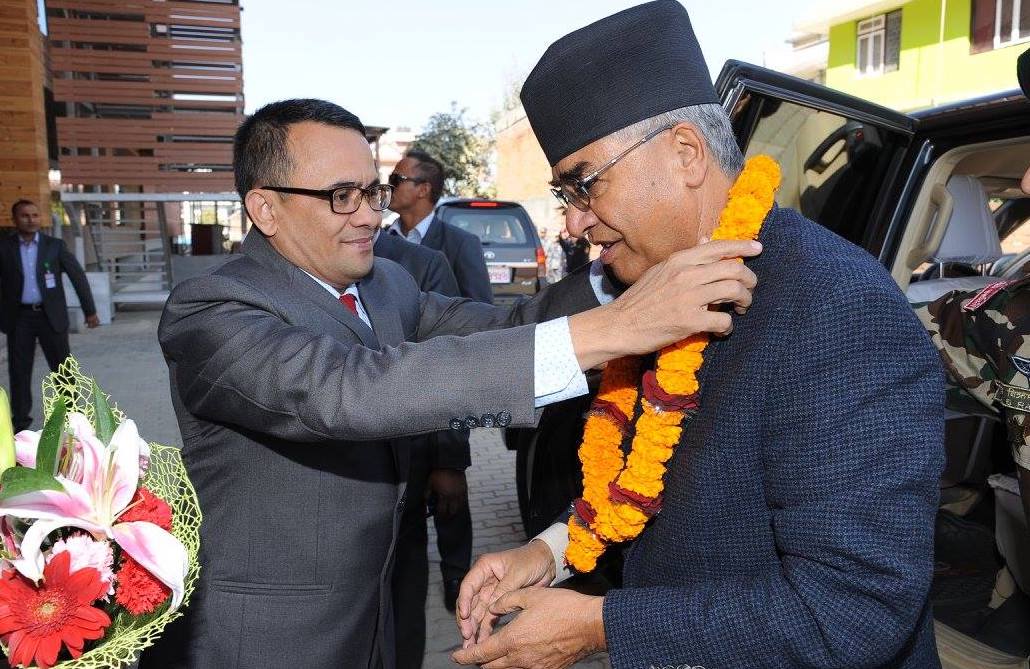Summary
In its 12 July 2021 verdict, the Supreme Court of Nepal reinstated the dissolved Lower House of Parliament and ordered the appointment of Sher Bahadur Deuba as the country’s prime minister. Now, the major challenge for Deuba is to win the vote of confidence.
On 12 July 2021, for the second time in last five months, Nepal’s Supreme Court (SC) reinstated the dissolved House of Representatives. Written by the Chief Justice of Nepal, Cholendra Shumsher Rana, the five-judge bench’s verdict stated, “President Bidya Devi Bhandari’s decision to dissolve the Lower House upon a recommendation of Prime Minister K P Sharma Oli was an unconstitutional act.” The SC also issued mandamus to appoint the leader of Nepali Congress, Sher Bahadur Deuba, as Nepal’s prime minister. Honouring the SC’s order, Oli resigned from his position. In his farewell speech, he said, “I had the mandate but the mandamus of the court went in Deuba’s favour.”
In an effort to provide political stability in Nepal, Oli and Pushpa Kamal Dahal buried their differences and agreed to merge the Communist Party of Nepal (Unified Marxist-Leninist) (CPN-UML) and Communist Party of Nepal (Maoist Centre) in 2018. Along with the merger, Oli and Dahal also reached an agreement on power-sharing. The four-point agreement also stated that both Oli and Dahal would lead the government for an equal period of time. However, serious political differences emerged between the two of them. Efforts to find an amicable political solution failed. Eventually, on 2 May 2021, to prove his political strength, Oli decided to seek a trust vote in the Lower House of the Parliament. On 4 May 2021, the Standing Committee of the Maoist Centre decided to withdraw its support for the Oli-led government.
In the trust vote on 10 May 2021, 93 members of the Lower House supported Oli’s government while 124 opposed it. However, three days after the defeat, Oli was reappointed as prime minister under the provisions of Article 76 (3) of Nepal’s constitution. According to Article 76(3), “in cases where prime minister cannot be appointed under Clause (2) or the prime minister so appointed fails to secure a vote of confidence within 30 days from the date of appointment, the President shall appoint as the prime minister the parliamentary party leader of the party which has the highest number of members in the House of Representatives .” On 21 May 2021, the President of Nepal, Bidya Devi Bhandari, asked for a “suitable candidate” to stake claim for the prime minister’s position by 5.00pm the next day. At that time, Deuba submitted a list of 149 members supporting him while Oli’s list claimed the support of 153 members from the Lower House. Oli’s list was mainly based on letters from the leaders of various political parties suggesting that their members were bound by party whips. Both claims were rejected by the President and Oli was re-appointed until the next elections without mentioning the word ‘caretaker’. Also, at the recommendation of Oli, Bhandari dissolved the Lower House.
In reaction to the President’s act, about 30 petitions were filed with the SC. One of the petitions had the signatures of 146 lawmakers demanding the reinstatement of the Lower House and appointment of Deuba as the prime minister. A week before the SC’s 12 July 2021 verdict, Nepal’s Election Commission released a schedule for snap polls in November 2021.
The SC’s verdict has given a new turn in Nepal’s politics. On the SC’s order, Deuba has assumed the prime minister’s office for the fifth time. However, the key political challenge for him now is to find enough support by 12 August 2021 to win the vote of confidence. In the present Lower House, Deuba’s Nepali Congress has only 61 members. When he staked a claim to form the government in May 2021, he had the support of the Maoist Centre, the Madhav Kumar Nepal faction of the CPN-UML, and Upendra Yadav faction of the Janata Samajbadi Party (JSP). Political equations have changed in the last one and a half months. Madhav Nepal’s faction of the UML is no longer with the Deuba-led alliance. In what is largely seen as political reconciliation, on 11 July 2021, a day before the SC’s verdict, a 10-member task force of the CPN-UML drew up a 10-point deal to end the intra-party feud and find solutions to their problems.
In such a situation, Deuba can win the vote of confidence only if all 32 members from the JSP, which is a divided house, support him. Earlier, during the voting on 10 May 2021, the Mahanta Thakur-led faction of the JSP remained neutral while Yadav’s supporters voted against the trust motion.
The Nepali Congress expects that “the parties [which] supported them in the government formation will support the vote of the trust motion too.” In a bid to find support, Bal Krishna Khand, chief whip of the Nepali Congress and Home Minister of Nepal said, “We will approach all the parties for support. As the Supreme Court in its Monday verdict said no whip is applied against supporting government formation as per Article 76 (5), I think there will be no problem for lawmakers from the UML’s Nepal faction to support us.”
Given the present political situation, it is difficult for Deuba to find enough support to win the vote of confidence. If he wins, he will remain the country’s prime minister for the next one and a half years. However, if he loses, elections are likely to be held within six months.
. . . . .
Dr Amit Ranjan is a Research Fellow at the Institute of South Asian Studies (ISAS), an autonomous research institute at the National University of Singapore (NUS). He can be contacted at isasar@nus.edu.sg. The author bears full responsibility for the facts cited and opinions expressed in this paper.
Photo credit: Wikipedia
-
 More From :
More From :
-
 Tags :
Tags :
-
 Download PDF
Download PDF



